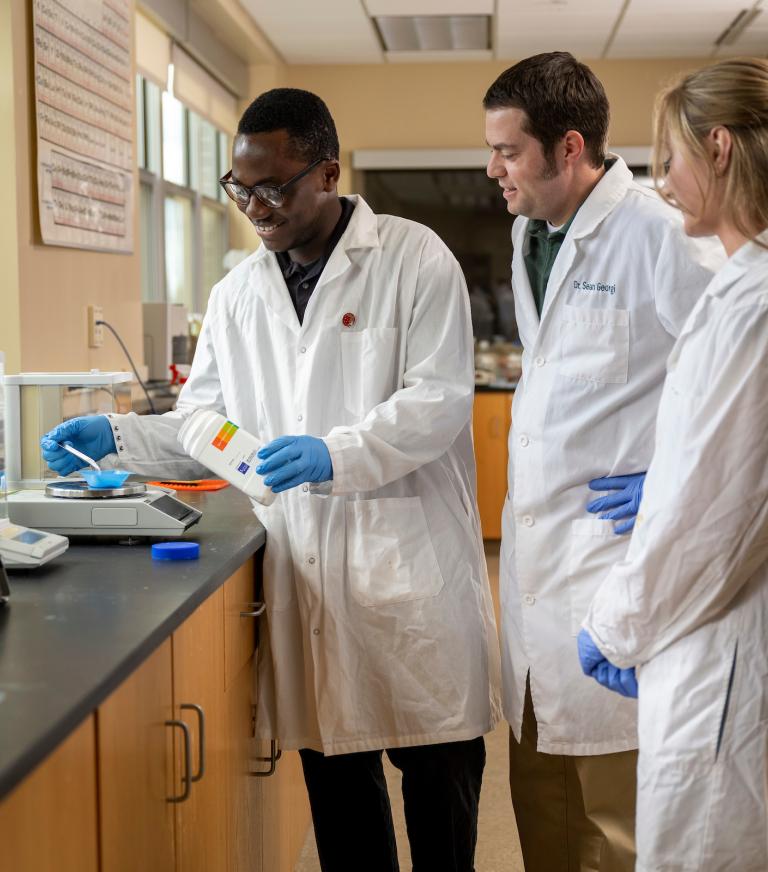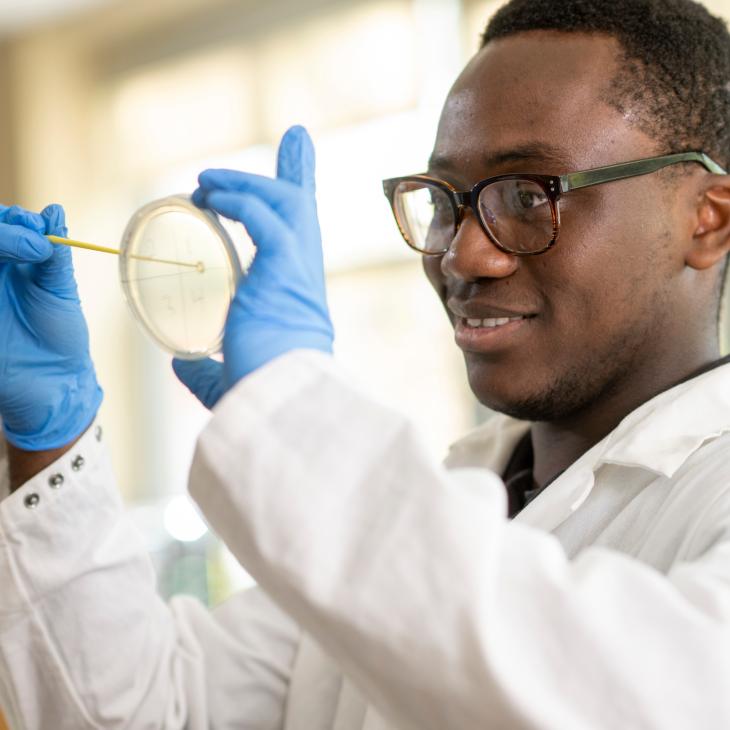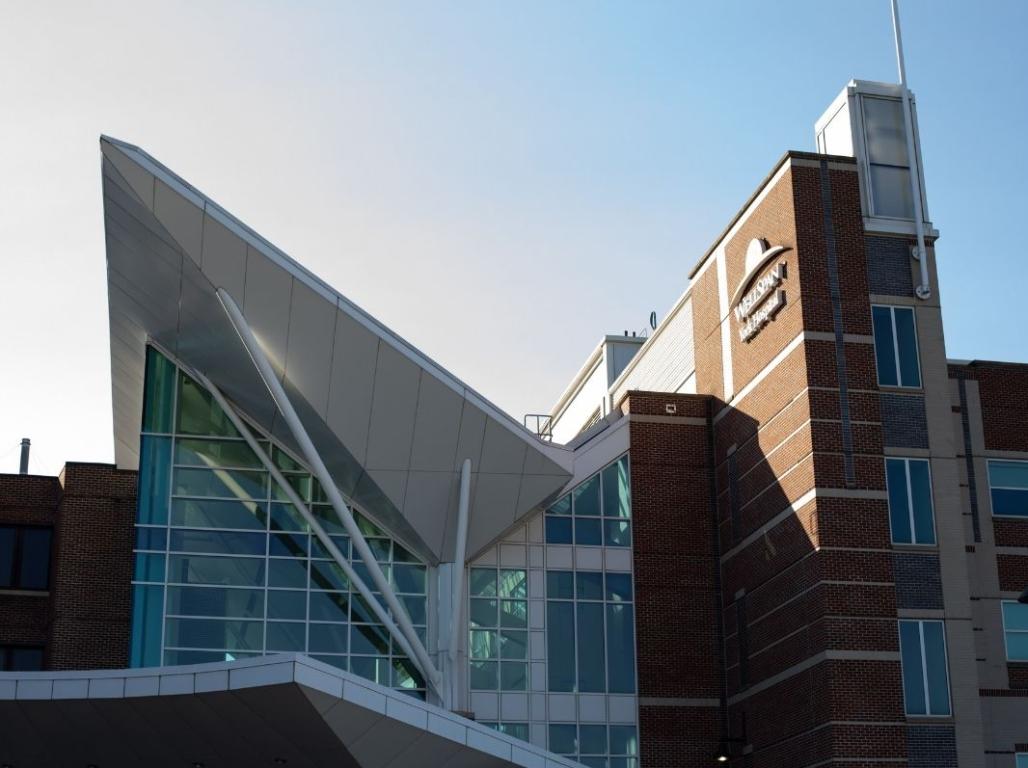Premedical Sciences


Get closer to medical and veterinary professions as a premed major at York.
York College of Pennsylvania’s Bachelor of Science (BS) in Premedical Sciences degree program prepares students academically and holistically for competitive pre-professional programs in medicine.
If you aspire to pursue a career in medicine, this premed major program offers a comprehensive education in the essential sciences and the foundation necessary for the rigors of medical school, dental school, PA school, pharmacy school, and more.
Gain core knowledge in the structure and function of the human and animal body in anticipation of applying to future medical programs — and gain hands-on practical experience in clinical practice and original research.
About the Premedical Sciences Major
Premedical Sciences Degree Requirements
Requirements for the BS in Premedical Sciences program are designed to meet the core scientific requirements of most professional schools, supplemented by a curriculum that addresses other competencies that are increasingly desired in medical candidates, including ethical responsibility, philosophy of medicine, critical thinking, quantitative reasoning, and research inquiry.
Premed major requirements include a minimum of 120 undergraduate course credits, spanning general education courses, foundational science courses, upper-level science electives, and free electives. Additionally, students participate in research and clinical shadowing opportunities.
Premedical Program Courses
Exceptional faculty members teach from real industry experience, offering their expertise and insight into the technical, as well as personal, aspects of entering advanced medical professions. You make take core courses such as:
- BIO 220: Human Anatomy and Physiology I
- BIO 222: Human Anatomy and Physiology II
- BIO 350: Biochemistry
- PHL 346: Bioethics
- HUM 310: Medical Humanities
Then, students in the Premedical Sciences degree program use their selection of many available elective courses to focus their studies according to their desired professional programs:
- BIO 308: Animal Physiology
- BIO 330: Microbiology
- BIO 332: Developmental Biology
- BIO 354: Immunology
- CHM 372: Introduction to Toxicology
- PMD 130: Emergency Medicine Grand Rounds
- PMD 230: Clinical Shadowing Rotations
Earn a Bachelor of Science in Premedical Sciences at York College of Pennsylvania
At York College of Pennsylvania, students in the BS in Premedical Sciences degree program experience a well-rounded education and invaluable clinical exposure, readying them to thrive in medical, veterinary, or dental school and their future careers as physicians.
Review undergraduate admissions information and apply to become a premed major at York today.
Prepare for Competitive Pre-Professional Medical Programs
Students in the BS in Premedical Sciences degree program prepare for various medical and graduate school programs by gaining a strong base in the sciences and participating in hands-on, hospital-based medical experiences.
Majoring in Premedical Sciences positions students for the advanced programs necessary to become professional care providers in the medical field, including programs in:
- Allopathic Medicine
- Osteopathic Medicine
- Veterinary Medicine
- Pharmacy
- Dental
- Optometry
- Chiropractic
- Physician Assistant
- Physical Therapy
- Dermatology
Students graduating from the Premedical Sciences degree program are also eligible for a number of scientific career areas, including basic research, laboratory science, or pharmaceutical sciences.
Advanced Healthcare Careers Outlook and Salary
According to the Bureau of Labor Statistics, healthcare occupations including diagnosing or treating practitioners will see a 13% rise in employment over the next ten years between 2021-2031.
Highly technical careers in healthcare require medical degrees or doctoral degrees and report some of the highest salaries in the field. Premedical Sciences majors can start on the pathway to these advanced degrees in pursuit of occupations with high average salaries including:
- Chiropractors—$75,000/year
- Medical scientists—$95,310/year
- Physical therapists—$95,620/year
- Veterinarians—$100,370/year
- Physician assistants—$121,530/year
- Optometrists—$124,300/year
- Pharmacists—$128,570/year
- Dentists—$163,220/year
- Physicians and surgeons—over $208,000/year
- Dermatologists—$302,740/year
Undergraduate Research Opportunities
Each student in the BS in Premedical Sciences degree program will participate in curriculum-based undergraduate research. As a member of the Council on Undergraduate Research (CUR), York is a hub for rigorous research in every discipline. The Undergraduate Research Showcase is an annual event where students from various York majors display their work and discuss their findings with others.
Premed majors have the opportunity to work one-on-one with faculty members to design and carry out independent research projects. Including a research focus in the Premedical Sciences program hones skills valued by pre-professional programs, including critical thinking, written communication, and quantitative and qualitative reasoning.
In-Setting Medical Experience
With the assistance of York’s community connections and the Premedical and Allied Health Society, students in various premedical career pathways can gain real-world experience in hospital and clinical settings. Strengthen your practical skills and demonstrate well-rounded training in your future applications to medical, dental, veterinary school, and more.
Students have the opportunity to shadow and interact with medical professionals and learn about how healthcare environments function through volunteer-based and extracurricular experiences at area healthcare systems, including Penn State Hershey and WellSpan York Hospital.
Summer Undergraduate Research Internship Program
York College also partners with WellSpan’s Summer Undergraduate Research Internship Program (SURIP) to offer opportunities for paid work experiences in their research facilities. Students must apply for this selective program, and if accepted, will conduct summer research alongside WellSpan investigators and clinical research staff. Student researchers receive a stipend for their work.
Meet and Work With Experts in the Field
The Premedical Sciences degree program advisor’s role is to ensure each student is informed of the extracurricular activities that could supplement their learning. York faculty also assist students with premed coursework in small classes and serve as mentors and sources of support during student independent research.
Outside of the classroom, premed majors may explore networking opportunities with professionals in various fields, from dentistry to veterinary medicine to medical specialties.
Premedical Career Support and Peer Organizations
Among the over 100 student clubs and organizations on the York campus, the Premedical and Allied Health Society (PMAHS) is a group providing constant support by and for students who are planning on applying to medical and pre-professional programs after earning their bachelor’s degree.
The PMAHS can help you prepare for the MCAT, find a mentor, and participate in volunteer opportunities in real-world settings. It also plans various activities for premed majors, including visiting guest speakers, blood drives, and CPR and first aid training.
Skills for Success in Graduate Education
York’s premed major program provides students with a diverse skill set, including a foundational understanding of biological and chemical processes, effective communication skills, and practical experience in research and clinical settings.
- Foundational knowledge of biological processes and chemical principles
- Ability to design and conduct experiments and research studies to investigate hypotheses
- Skills in data collection, analysis, and interpretation
- An understanding of medical ethics and legal issues related to healthcare
- Experience working in a team-based, collaborative environment with colleagues and mentors
- Mathematical skills including statistics
- Effective communication for speaking with patients, colleagues, and other professionals
Graduates of the BS in Premedical Sciences degree program develop the skills to succeed in advanced medical and professional programs, including empathy, compassion, and professionalism in healthcare interactions.
Premedical Sciences Courses
Your class schedule will include core courses for your major, Gen Next general education classes, and electives.
| Course Name | Course Code | Credits |
|---|---|---|
| Human Anatomy and Physiology I | BIO 220 | 4 Credits |
| Human Anatomy and Physiology II | BIO 222 | 4 Credits |
| Biochemistry | BIO 350 | 4 Credits |
| Bioethics | PHL 346 | 3 Credits |
| Medical Humanities | HUM 310 | 3 Credits |
Careers in Premedical Sciences
These are just a few of the many career opportunities graduates of the Premedical Sciences degree may find:
Chiropractor
Pharmacist
Medical Scientist
Physical Therapist
Veterinarian
Dentist
Frequently Asked Questions
If you want to major in pre-med in college, you should consider factors such as the program curriculum, opportunities for research and clinical experience, availability of advising and mentorship, and institutional resources for preparing for the MCAT and your specific desired career path.
Not every college or university has a dedicated premed major program. Some may offer similar tracks or pathways that prepare students for medical school. It’s important to research each institution’s curriculum and resources to determine the best fit for your academic and career goals.
Compared to science degree programs in biology or related areas, premed major programs typically have a more specific focus on preparing students for medical and professional programs. Other science-related majors may have a broader focus on scientific discovery, but they may not necessarily include the same level of preparation for medical school or opportunities for tailored clinical and research experience.

Build your dream career, one day at a time.
This is day one. From your first semester on campus through graduation day, York College offers expert advice, professional development opportunities, and personalized support to help you navigate the choices that influence your future.
Explore resources for a successful college experience:
Meet the Faculty
View All FacultyPremedical Sciences in Action
View All NewsRelated Programs
Biochemistry
York College of Pennsylvania’s interdisciplinary BS in Biochemistry degree program is a gateway to a multitude of post-graduate opportunities in biomedical science, healthcare, academics, industry, and public health. Through a student-centered approach to learning, Biochemistry majors at York College prepare to enter the field as trained chemists or pursue further education backed by internships and research experience.
Cannabis Chemistry
York College of Pennsylvania’s Bachelor of Science (BS) in Cannabis Chemistry degree program provides specialized education in the extraction and purification of plant products as specialized training for careers in the cannabis industry, plant chemistry, and various environmental applications.
Health Sciences
York College of Pennsylvania’s Bachelor of Science (B.S.) in Health Sciences degree program is designed to increase students’ career opportunities across the healthcare industry. Many fields within healthcare are growing rapidly. With three degree concentrations to choose from, our B.S. in Health Sciences program trains students interested in professional medical careers like physical therapist or pharmacist, those interested in administrative healthcare positions, and students seeking careers in community settings and human services.








